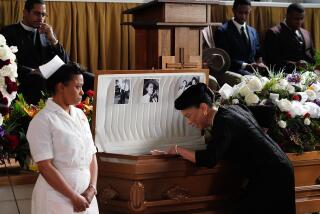MICHAEL WOOD: Exploring Civilized Worlds
- Share via
Michael Wood, the British writer and host of the two popular PBS series “In Search of the Trojan War” (1985) and “Art of the Western World” (1989), explores the rich heritage of great civilizations born in the last 5,000 years in his new six-part series “Legacy.”
In this ambitious project, Wood takes viewers on a journey through Iraq, India, China, Egypt, Central America and Europe, examining each area’s ancient culture. Wood also chronicles the crises, wars and natural catastrophes that helped shape the civilizations.
Wood discussed his “Legacy” with TV Times Staff Writer Susan King while on a brief visit to Los Angeles.
You filmed in Iraq right before the Gulf War. Was it difficult to get permission to shoot there?
Very, very difficult. There was one faction within their government keen to open up to the West and become more accepted in the world and the others were these fascistic, Saddam’s lot who didn’t want any of that.
We just got this moment where the foreign ministry people, who were pro-Western, let us in. They felt a film like this would do Iraq good and would show the other side of Iraq, which it does. Given that, they stopped us filming women, they stopped us filming Bedouins, they stopped us filming poor people. (I had) constant arguments and constant struggles. We had a party security man with us all the time and he was very frightened because it is a police state and if you foul up your family can be tortured.
How did “Legacy” come about? Was it a natural progression from your other documentaries?
I wouldn’t say you set out with this great kind of mission or anything like that. They are just television films. I always see work as an act of exploration.
I was in China in 1985 and had gone to the far west of China, where Pakistan, Tibet and the (former) Soviet Union meet. I sat down and scribbled out an idea of a book about the end of the millennium and about the native cultures and the traditions of the world. It was a realization that the journeys I had made over the previous years started to add up to something.
Since ’85 I have traveled almost continuously. I have been to India seven or eight times; China about three times. I originally wrote the idea for 13 films, but for reasons of time and money we confined ourselves to the key originals.
Do you think the culture of the six regions you explore will survive?
I think that is what is so fascinating. We are in a period of amazing change. All of history has changed, but the pace has changed. International culture is so fast. Our lifetime will be the watershed. A lot of things are going under or will survive in a modern form. We are witnesses of the end of a lot of traditional cultures.
Even in India?
I think India may change and remake itself. But it definitely is going through great changes. There are 200 million middle-class people in India, and as soon as you have middle-class and consumerism, what is in it for you to do six rituals a day?
It’s like Islam, isn’t it? It’s poor people who in the main will focus on religion.
The Shiites in Iraq are the guardians of one of the most ancient cultures in the world and (Saddam’s forces) are draining the marshes, they have devastated the sacred cities, destroyed the libraries, arrested the clergy and killed vast numbers of people. How will it survive? I don’t know.
You call the English and the Europeans the “Barbaric West” in the series. What type of response did you receive from viewers when “Legacy” aired in England last year?
They had the biggest letter response they ever had from the public--20,000 letters. What really pleased me was that I got lots of letters from Indians and Iraqis saying they had really been moved.
I got some response from Brits who said I was too hard on them in the Indian program. It is true, of course, that the Brits did a lot of good things by chance or design in India. They did develop this idea that they would improve the land. They did develop this idea of “Empire” being a mission to civilize, but it is that I am questioning. Even that idea contains within it that (the British) civilization is superior. The British were imperialistic like all the other imperialists. They occupied the land; they took what they wanted from it.
Did making “Legacy” change you?
I think it broadened my experience of the world. I had been to these countries before. I am sure I will go back to China more often than I have done in the past. It is a wonderful country. The best experience in some ways for me, just in point of view of the heart and hospitality, was China. I had the most fantastic time there making the film.
Just in terms of personal knowledge, I hadn’t traveled very much in Islamic countries. I knew something about Islam and had an interest in it, but you gain a much better sympathy for a culture if you immerse yourself in it in real time and real life.
We have this image of Shiites on TV as being loony fanatics, and actually I found I had a real soft spot (for them). They are the kind of people who have suffered for all of their history and (are) being constantly attacked and persecuted. Their southern landscape is very affecting and there is something about it which is terribly haunting. For some strange and indefinable reason, part of my heart was left with the Shiites of southern Iraq.
“Legacy” airs Sunday-Tuesday at 7 p.m. on KVCR and 8 p.m. on KCET and KPBS. The series repeats Wednesday-Friday at 1 p.m. on KPBS. All six hours repeat in full beginning Saturday at 10:30 a.m. on KVCR and Feb. 9 at 2 p.m. on KCET.
More to Read
The complete guide to home viewing
Get Screen Gab for everything about the TV shows and streaming movies everyone’s talking about.
You may occasionally receive promotional content from the Los Angeles Times.







